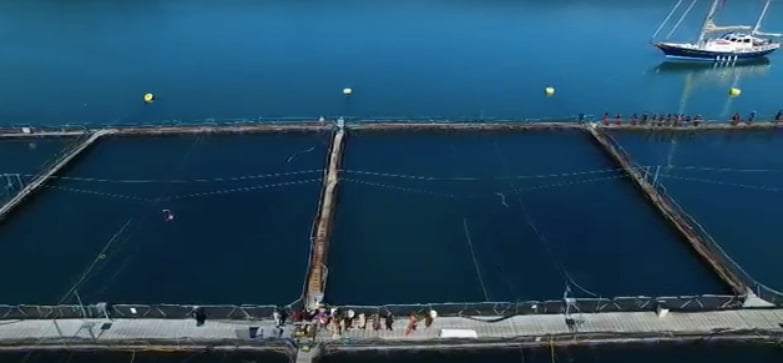Fish farm critic Alexandra Morton and three Dzawada’enuxw hereditary leaders have told the B.C. Supreme Court that the Norwegian aquaculture company Marine Harvest has no legal right to bar them from the corporation’s fish farms in Dzawada’enuxw territory.
The argument, made in response to Marine Harvest’s lawsuit against Morton, is the latest twist in what’s shaping up to be a major legal battle over First Nations’ rights and the province’s controversial fish farm industry.
In September, Marine Harvest sued Morton, a long-time critic of the company’s operations, for “occupying, blocking or physically impeding the plaintiffs aquaculture sites” in the Broughton Archipelago and Okisollo Channel during a Sea Shepherd campaign to audit the industry.
The Marine Harvest lawsuit named Morton and “John and Jane Doe and all other persons unknown to the Plaintiff.”
On Aug. 23, Morton accompanied almost 60 members of Dzawada’enuxw First Nation and other bands as they boarded a fish farm, issued an eviction notice and conducted a “cleansing ceremony.” The lawsuit alleges Morton and others ignored demands to leave, “tampered with equipment” and inserted a camera into an open net pen. The resulting video shows crowded fish apparently suffering from tumours and emaciation and has been viewed one million times.
But now three Dzawada’enuxw hereditary leaders from Kingcome Village, Willie Moon, Joe Willie and Farron Soukochoff, have identified themselves as the “others” and this week filed a joint response to the lawsuit with Morton.
The legal reply argues that Marine Harvest’s fish farms at Glacier Falls and Midsummer Island are within Dzawada’enuxw First Nation territory and that Morton was their guest “accompanying a Dzawada’enuxw representative who was delivering” an eviction notice to the company’s Glacier Falls operation.
The leaders argue that a ceremony conducted at the Midsummer facility was a “lawful act of traversing” within their territory and that they have a lawful right to conduct a “ceremony of elders.”
The response also denies Marine Harvest’s claim that the participants tampered with equipment or interfered with the fish farm operations.
Now that the Dzawada’enuxw have joined this case, Morton said she hopes Marine Harvest will now have to defend its licences and activities in Dzawada’enuxw territory.
“The Dzawada’enuxw have said no to fish farming industry for the last 29 years and have no relationship or contracts with this industry,” she said. “How can they say no to something in their territory, yet have a third of the province’s fish farms on their waters? How did that happen?”
The case is an opportunity for Prime Minister Justin Trudeau’s government to honour its promise of a new relationship with First Nations that respects their traditions and rights, she added.
Morton said the federal government should either order the removal of the farms or buy them and close them.
Last August, the Musgmagw Dzawada’enuwx Nation issued eviction notices to all fish farms in its territories, saying their people have a sacred duty to protect wild salmon and herring stocks for future generations.
“Marine Harvest has no authority on our lands,” said Chief Willie Moon in a press release. “You, Marine Harvest, are trespassing you have never been given the right to be in our territory.”
Due to concerns about the spread of disease to wild fish in fish farms, Morton has long supported a closed containment system for farmed salmon on land.
Morton has lived in Dzawada’enuxw territory for 30 years and has studied the growing impact of the industry on wild fish and whales.
Fish farms have impacted wild salmon populations in Canada for years. Research by Morton and other scientists has shown that approximately 29 per cent of the young salmon leaving Dzawada’enuxw territory in 2015 were killed by sea lice infestations.
The peer-reviewed paper concluded that “that unusual environmental conditions, combined with delayed farm management actions, likely played a role by increasing louse abundance on salmon farms and transmission to juvenile wild salmon.”
Marine Harvest Canada currently operates within the traditional territories of 25 Canadian First Nations but only has formal contractual agreements with 15 of these nations and six First Nation-owned businesses. The Dzawada’enuxw are not among them.
This year B.C.’s sockeye salmon run reached its lowest level in the last 120 years, prompting the complete closure of the commercial and First Nations fisheries on the Fraser River.
Researchers suspect warming Pacific waters caused by climate change and the impact of fish farms have all played a role in the slow destruction of wild salmon populations.
Persistent problems with disease, sea lice and escapees in Norwegian fish farms forced the Research Council of Norway in 2015 to begin an eight-year research project to find alternatives to open net systems in the ocean. ![]()
Read more: Environment
















Tyee Commenting Guidelines
Comments that violate guidelines risk being deleted, and violations may result in a temporary or permanent user ban. Maintain the spirit of good conversation to stay in the discussion.
*Please note The Tyee is not a forum for spreading misinformation about COVID-19, denying its existence or minimizing its risk to public health.
Do:
Do not: